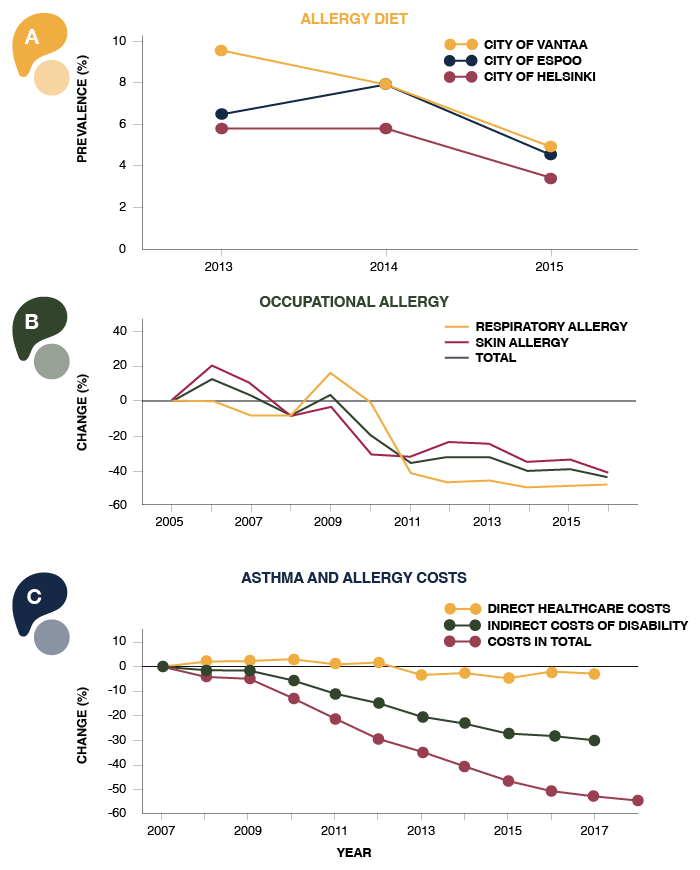EPISODE 7
Allergy programme:
a sequel to the successful
asthma programme
Introduction
With the successful Asthma Programme paving the way, the Allergy Programme (2008–2018) was launched to further alleviate the burden of allergic diseases and asthma. The objective was to shift public attitudes on allergy prevention and management. Comprehensive education emphasising the importance of tolerance reached healthcare professionals, patients, families, and the general public. The programme led to significant improvements in patient well-being, changes in practices and attitudes, and substantial cost savings. (1)
Read the article and watch respiratory physician Jere Reijula and otorhinolaryngologist Sanna Toppila-Salmi discuss the changes achieved by the programme in allergy practice.
Allergy programme: a sequel to the successful asthma programme
Allergic diseases and asthma have been rising around the world, and within Finland. To explore the long-term patterns in prevalence, researchers have analysed the health records from Finnish military conscripts, including over 90% of all young men. Respiratory physician Jere Reijula described the alarming shift: “There was no substantial difference in the prevalence of allergic diseases between the 1920s and the 1960s, but thereafter, the prevalence exploded”.
For instance, the prevalence of allergic rhinitis increased over 100-fold from 0.06% in 1966 to 10.70% in 2017. Also the prevalence of atopic eczema exhibited a nearly 20-fold increase from 0.15% to 2.90% during the same period. (2)
Evolving strategies for allergy health
The Allergy Programme was directed to everyone: healthcare professionals, patients, families, and the general public. The five key messages entailed:
- Endorse health, not allergy
- Strengthen tolerance
- Adopt a new attitude to allergy, and avoid allergens only if mandatory
- Recognise and treat severe allergies early, and prevent exacerbations
- Improve air quality, and stop smoking
The programme introduced the concept of allergy health to endorse psychological tolerance. According to the concept, mild symptoms, especially in children, were perceived as a part of normal immune development rather than requiring specific guidance or intervention. For instance, the new recommendations aimed to reduce unnecessary allergy diets in day care. (1)
The traditional avoidance strategy was replaced with a focus on promoting nature contacts which play an important role in maintaining balanced immunoregulatory circuits. Avoidance of allergens was still considered important for individual patients, especially in cases of severe allergy. While the programme aimed to reduce unnecessary treatments, special attention was given to severe allergy and asthma. (1)
Achieving results with novel measures
The real-world intervention conducted among the entire Finnish population indicated that attitudes can be changed, treatment and prevention can be enhanced, and costs can be reduced. One of the main goals of the programme was allergy prevention: although the prevalence of allergic diseases and asthma did not decrease during the 10-year programme, they were successfully stabilised after decades of rise. (1)

Figure 1. Main outcomes of the Finnish Allergy Programme. A, Prevalence of allergy diets in day care in three cities. B, Change in occupational respiratory and skin allergies. C, Change in healthcare, disability, and total costs.
The programme also witnessed positive progress in terms of improved tolerance, including a decrease of 43–65% in food allergy diets in children’s daycare (1, Fig 1A). “We have been able to focus on those children who have true, very severe food allergies”, said Toppila-Salmi.
Additionally, occupational allergies saw a reduction of 45% (1, Fig 1B). Moreover, there was a decrease of nearly one-third in the total annual costs of allergic diseases and asthma, mostly attributed to a reduced impact on ability to work (1, Fig 1D).
Reijula emphasised the significance of encouraging colleagues to inquire about patient well-being, asking about any symptoms they may be experiencing and whether they are avoiding certain activities in their daily lives, particularly during allergy seasons. Toppila-Salmi concluded that most individuals can fully embrace their lives, engaging in outdoor activities, while effectively managing their allergies and asthma with the available medications and treatment options.
You might interested in these:
References
RESP-1483g 05/2023